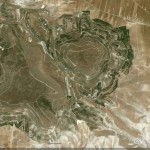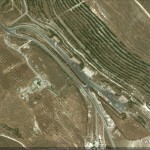UPDATE (2011-10-10): According to the Jordan Times, the Bank denies any involvement:
The Arab Bank on Sunday stressed that it has never dealt with the government of North Korea or Tanchon Bank, which the US has accused of being the primary financial agent behind Pyongyang’s weapons programmes. “Based on a review of its customer account and transaction records, Arab Bank does not believe that it has conducted business with the government of North Korea or Tanchon Bank,” a spokesperson from the Arab Bank said.
In a diplomatic cable sent by the US State Department to the US embassy in Amman in August 2007, officials warned that the Arab Bank could be unwittingly assisting proliferation-related transfers between Iran, Syria and North Korea. “We are concerned that Iran, Syria and DPRK [Democratic People’s Republic of Korea] proliferation entities are using the Arab Bank network to process what may be proliferation-related transactions,” read the cable, released by WikiLeaks on its website at the end of August and viewed by The Jordan Times.
According to the cable, the US knew that as of 2007, North Korea’s Foreign Trade Bank mission in Tripoli, Libya (FTB Libya) had expanded its role in North Korea’s banking network and was helping Tanchon Commercial Bank, the banking arm of North Korea’s primary weapons trading firm, KOMID, to move funds from both Syria and Iran.
It added that in 2007, FTB Libya provided assistance to Tanchon in making remittances from funds from the sale of unspecified, probably proliferation-related goods in Syria.
“Our information indicates that Tanchon is establishing this new arrangement because Tanchon could no longer remit funds through a route it had previously used. FTB Libya arranged remittance routes for Tanchon from Syria and other locations via intermediary banks… We have information that Tanchon’s financial transfers are conducted surreptitiously by using either aliases or front companies,” the US State Department said in the cable.
The US reportedly claimed that the transfers, which were probably proliferation-related, occurred inside the Arab Bank network and involved both Arab Bank branches and the Arab Tunisian Bank, of which, according to the US, the Arab Bank is a 64.2 per cent stakeholder.
“By processing these transactions, Arab Bank could be unwittingly assisting proliferation-related activities,” read the cable.
In the cable, the State Department called on Jordan to maintain vigilance with regard to Syrian, Iranian and North Korean financial transactions in its jurisdiction to prevent these countries from using deceptive financial practices to further their proliferation-related activities, urging appropriate authorities to investigate such transactions.
The Arab Bank spokesperson told The Jordan Times that the bank has not found any records indicating that Jordanian government officials provided it with information concerning surreptitious efforts by North Korea to move funds through its network.
Citing the cable’s reference to “deceptive financial practices” by North Korea, the spokesperson emphasised that without knowing the details of these efforts by North Korea to conceal its financial transactions, it is not possible for Arab Bank or any other bank to address these allegations with any more specificity.
“As noted in the US State Department cable, Arab Bank is one of the ‘most respected banks in the Middle East’, with a network that spans 30 countries and five continents. The bank maintains a state of the art compliance programme, works closely with banking regulators in all countries where it operates, and has a long history of providing safe and secure banking services,” the spokesperson stressed.
A US embassy official in Amman told The Jordan Times last week that the embassy’s policy is not to comment on WikiLeaks cables.
ORIGINAL POST (2011-10-7): According to the Wall Street Journal:
As it sought to stop North Korea from spreading its nuclear technology, the U.S. uncovered signs in 2007 that the country was channeling funds through a major Middle Eastern bank based in Jordan, one of its closest regional allies, according to diplomatic cables posted online by document leaking website WikiLeaks.
In the cables, viewed by The Wall Street Journal, U.S. officials warned their counterparts in Jordan that North Korea was using Amman-based Arab Bank PLC to receive money from Syria and Iran, circumventing international sanctions.
The U.S. has said, apart from the cables, that it believes Syria purchased North Korean nuclear technology, including a nuclear reactor that Israel bombed in 2007. The U.S. also believes that Iran has acquired long-range missiles from North Korea.
“We are concerned that Iran, Syria, and DPRK [North Korea] proliferation entities are using the Arab Bank network to process what may be proliferation-related transactions,” read an August 2007 cable from the U.S. State Department to the U.S. Embassy in Amman.
The warnings provide a rare glimpse into U.S. efforts to stop North Korea from spreading arms and nuclear technology to its enemies. U.S. officials have said as recently as last month that North Korea is still aggressively establishing a network of front companies through which to secretly sell its weapons and evade sanctions.
“U.S. efforts have helped to spur isolation, but I think there is still a cat-and-mouse aspect to North Korean illicit financial activity,” Juan Zarate, a White House counterterrorism official until 2009, said Thursday.
In the cables, the U.S. said it was concerned that North Korea helped one of its lenders, Tanchon Commercial Bank, which it describes as the “primary financial agent behind the DPRK’s weapons programs,” to funnel money from Syria and Iran through Arab Bank.
The governments of Syria, Iran and North Korea didn’t respond to calls and emails requesting comment. A spokeswoman for the Jordanian Embassy in Washington declined to comment.
The cables said those transactions “have occurred through Arab Bank PLC, one of the oldest and most respected banks in the Middle East.”
Arab Bank said it didn’t believe it had processed any North Korean funds. “Based on a review of its customer account and transaction records, Arab Bank does not believe that it has conducted business with the government of North Korea or Tanchon Bank,” the bank said.
“In addition, Arab Bank has not found any records indicating that government officials provided information to the bank concerning surreptitious efforts by North Korea to move funds through its network,” it said.
The U.S. cables, which were posted at the end of August, suggest that Arab Bank may have processed the purported North Korean transactions unwittingly. They say that Tanchon was conducting its financial transfers surreptitiously using aliases and front companies.
In interviews, current and former U.S. officials said warnings such as those reported in the cables aren’t unusual and don’t indicate that they viewed Arab Bank as a particular cause for concern.
The bank was fined by U.S. banking regulators in 2005 for lacking adequate safeguards to stop money laundering and terrorist financing. Since then, a U.S. official said, Arab Bank has taken major steps to shore up its internal controls and has emerged as one of the more responsible lenders in the region.
The cables don’t say how large the purported transactions were, or their purpose. Nor do they say what, if anything, was done after the warnings.
Arab Bank is facing several civil lawsuits in a New York federal court dating to 2004 that allege it knowingly helped fund Palestinian terrorist attacks. The suits, brought by family members of those killed or injured in the attacks, allege the bank acted as a conduit for money from Saudi donors that went to families of suicide bombers and terror groups, a charge the bank denies.
In a statement, Arab Bank said it complies with banking laws in all 30 countries where it does business, including the U.S. “The bank abhors terrorism and has not done business with terrorists or terrorist organizations designated by these countries,” it said.
Jordan has interceded on Arab Bank’s behalf in the suits, arguing that the bank is being unfairly punished for failing to turn over what it says are confidential client records. In a November 2010 court brief, Jordan said a set of legal sanctions imposed by the U.S. judge hearing the case could destroy the bank. Because Arab Bank was a crucial cog in the regional economy, that outcome would be “potentially calamitous” for the economies of the Middle East, the brief said.
The appeals court has called a hearing on Nov. 14. However, Arab Bank has asked for it to be postponed as its lawyer cannot make it that day due to a conflict with another case.
While the leaked cables show the U.S. had concerns about illicit money transfers at Arab Bank two years after the 2005 punishment, they also include a U.S. expression of support for the bank. In a July 2008 cable, the U.S. Embassy in Amman said it saw no reason why the U.S. shouldn’t provide financing for Arab Bank and two other Jordanian financial institutions.
“The embassy does not have any information that these banks or their investors have known ties to terrorists, money laundering, corruption, or violations of the law,” it stated.
According to UPI:
A bank in Jordan, a strong U.S. ally in the region, may have unknowingly moved cash for the North Koreans to finance illicit weapons programs, cables suggest.
Sensitive cables distributed by WikiLeaks and reviewed by The Wall Street Journal suggest Jordan’s Arab Bank PLC was used by North Korea to get money from Syria and Iran to help with its proliferation activity.
An August 2007 cable from the U.S. State Department to Washington’s embassy in Amman expressed concern “that Iran, Syria and DPRK (North Korea) proliferation entities are using the Arab Bank network to process what may be proliferation-related transactions.”
Arab Bank, in a statement published by the Journal, said it “does not believe” it carried out business with the North Koreans. The bank was fined in 2005 by U.S. banking regulators for not having mechanisms in place to prevent money laundering and terrorist financing, the newspaper adds.
The cables suggest the Jordanian bank processed the North Korean activity without knowing about it.
The International Atomic Energy Agency, at its regular summer meeting with the board of governors in Vienna, expressed concern about the Syrian, North Korean and Iranian nuclear programs.
I have created a wikileaks story index which you can see here.
Read the full stories here:
Cables Say Syria, Iran Illegally Moved Cash to North Korea
Wall Street Journal
Thomas Catan
2011-10-7
Jordanian bank tied to illicit weapons?
UPI
2011-10-7


